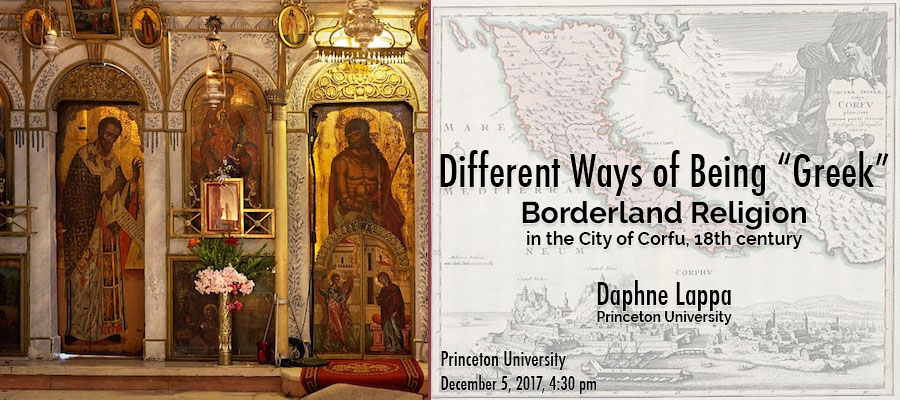Different Ways of Being “Greek”: Borderland Religion in the City of Corfu, 18th century, lecture by Daphne Lappa (Hannah Seeger Davis Postdoctoral Fellow, Hellenic Studies, Princeton University), December 5, 2017, 4:30 pm
Respondent: Teresa Shawcross, History and Hellenic Studies
What did it mean to be Greek-Orthodox in the early modern Venetian and Ottoman lands? Was this a uniform category? Or, could it take on different, local contents? For example, how would a Greek-Orthodox Christian from Ottoman Epirus, who spoke Greek, was dressed in the Ottoman style and recognized as head of his religious community the Patriarch of Constantinople, see those Greek-Orthodox living in the Venetian city of Corfu, speaking heavily-Italianized Greek or Italian, wearing their European clothes and their wigs, living in a westernized urban environment, and having as religious leader a local figure that was under the sole jurisdiction of the local Venetian government? Did these two “types” represent two different versions of Greek-Orthodox Christianity? Using the concept of borderland religion to frame the very local, urban religious mélange of Latin and Greek elements in Corfu, and comparing the latter with Ottoman Orthodox religiosity, the paper suggests that in the pre-modern world there were more than one ways of being “Greek”.
Daphne Lappa earned a B.A. in History from the University of Crete, and M.A. and Ph.D. degrees from the European University Institute in Florence. She was a postdoctoral research fellow (2015-16) at the Digital Humanities Laboratory of the Polytechnic School of Lausanne. Her research interests engage with different aspects of religious group formation and cross-confessional dynamics in the pre-modern Eastern Mediterranean as well as their legacy in the world of nation-states. Daphne Lappa’s doctoral and postdoctoral projects focused on the religious conversion of Jews and Muslims to Christianity and their cross-confessional networks in early modern Venice and Venetian Corfu (mid-17th – 18th c.). Her new project engages with local versions of early modern Greek-Orthodox Christianity, as well as the confessionalization process within the Greek-Orthodox Church.
